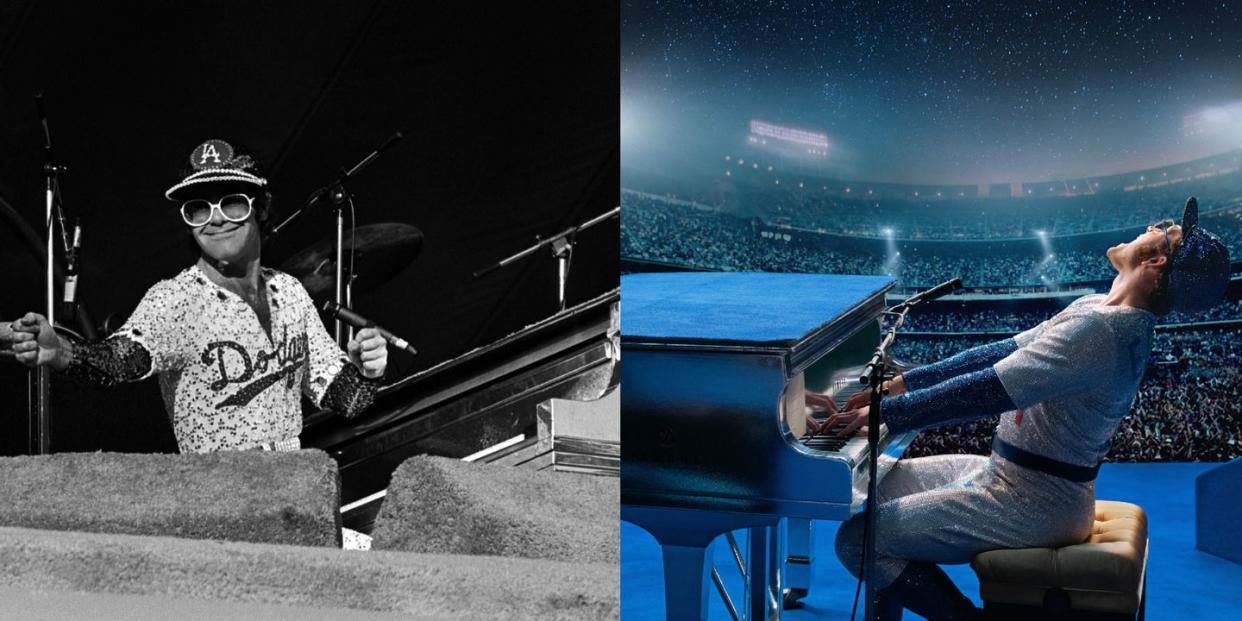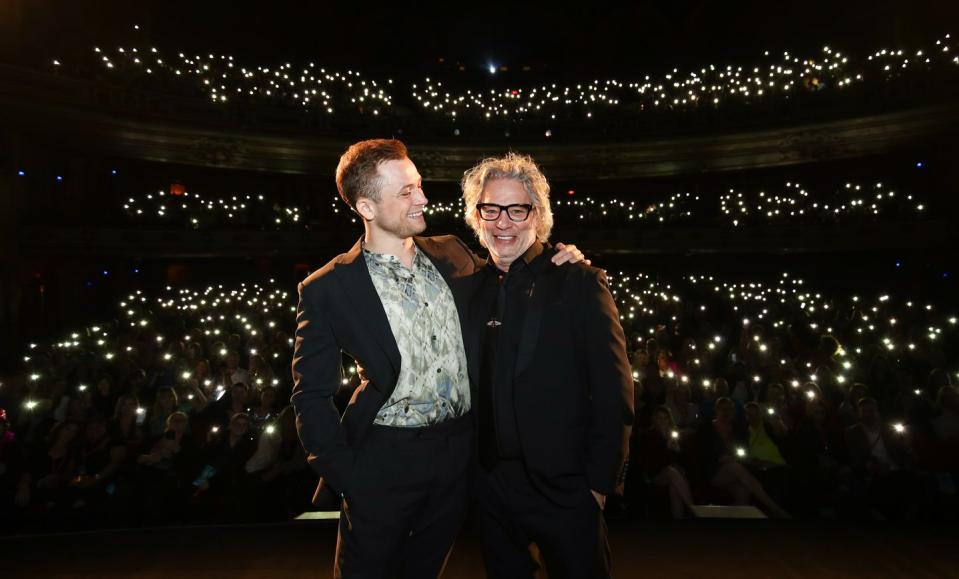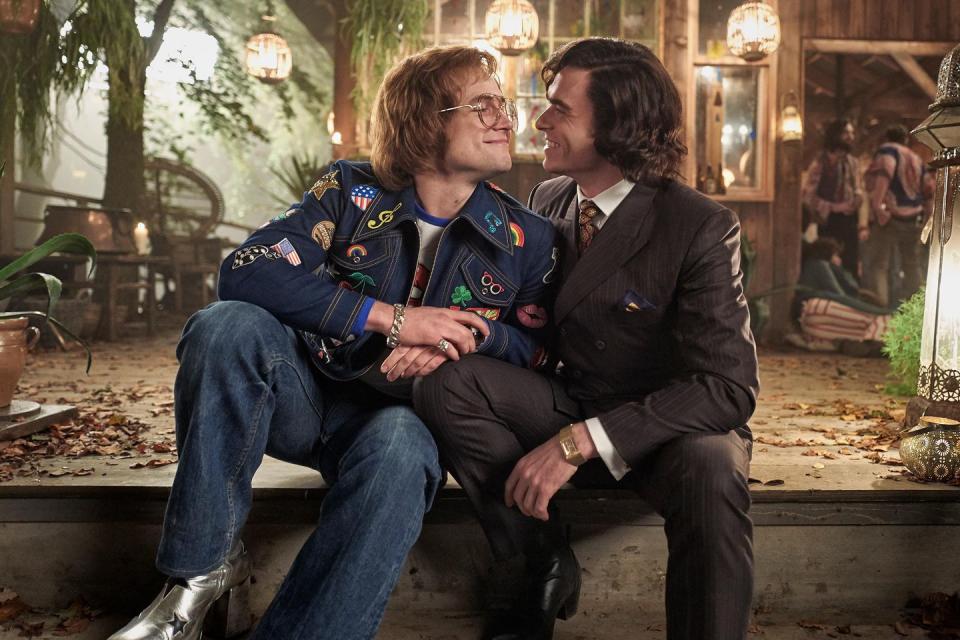The Changes 'Rocketman' Made to Elton John's Real Life Actually Work

As you've probably gathered, Elton John did not literally levitate along with the audience during his August 25, 1970 show at the Troubadour in Los Angeles. Neither did he turn into an actual "rocket man" during his Dodgers Stadium shows in October 1975. But that's how events are depicted in Rocketman, the film about Elton John, because this is not a biography-it's a musical intended to capture the emotion of John's life, as the movie's director, Dexter Fletcher, tells me.
"There could be a factual, chronological documentary that would tell you absolutely everything about what Elton did, where he was, and when he did it, but the film just absolutely explores his inner, emotional life," Fletcher says. "We know he was at the Troubadour, but it's really trying to communicate what that felt like, not just the fact that he was there."
The script was developed by Lee Hall, who spent many hours with John, hearing stories and anecdotes, according to Fletcher. And, for the most part, the movie fairly accurately recreates John's life as a young boy through the '70s. There are some differences though.

The biggest changes involve how he met John Reid, his marriage to Renate Blauel, and the framing of the story using John's time in rehab. John did not meet Reid at an afterparty for his Troubadour show in L.A. The two actually met a year before this show, at a Christmas party in Motown's U.K. offices.
Rocketman depicts John getting married to Blauel sometime in the late '70s. However, the two met during the 1983 sessions for John's album, Victim of Love, and got married on Valentine's Day 1984. They divorced four years later.
The framing of Rocketman shows John storming out of his Madison Square Garden gig and going directly to rehab, where he tells his story. In reality, though, John didn't go to rehab until 1990 after his Sleeping With the Past tour. As John told Larry King in 2008 about his decision to go to rehab:
I was an alcoholic and a drug addict for 16 years. And during that time, the AIDS epidemic started, in the early '80s. I never felt really that, during that time, I did enough for AIDS, people with AIDS, being a gay man. I became very friendly with the Ryan White family, with Ryan and his mother Jeanie. And that helped me a lot to see how out of whack my life was, you know, how impossible my life had become, how self- obsessed I had become.
And shortly after Ryan died, which I was at the funeral for in Indianapolis-and I played at the funeral-I decided six months later, that my life was, you know, pretty horrible. And someone guided me into saying that I need help.
And I went into rehab and I, you know, I've been-this year, hopefully, in July, I'll be 18 years sober and clean. And as soon as I got sober and clean, I thought, you know what, I've been so fortunate to have, you know, been a drunk and been a drug addict and not become HIV-positive, and I've got to do something to help people like Ryan White and the people that I've kind of betrayed when I was doing those kind of things.
As Fletcher explains, it would have been impossible to create a strict biography of John's life. So he set out to do something different.
"My approach is always, it's a memory, not a biography. And a memory is absolutely linked and connected to feelings," Fletcher says. "Memories are not 'I went down to the shop and bought a pint of milk.' You know, that is a particularly dry story. If you say, 'I went down to the shop and I bought a milk bottle, but I was actually freezing and starving because I had no money, and it was the most important pint of milk I ever drank at that particular time in my life,' it's now about the emotional content of that. That makes it interesting."

As many John fans will likely notice, the songs in the film don't appear chronologically with John's life. That was intentional, according to Fletcher, because of this emotional story he was seeking to tell. In fact, the movie is similar to a musical, with songs that have already been written. "It's like Mamma Mia in one respect," Fletcher says.
"It's completely irrelevant, when the song was written," he adds. "Does it fit? What will you need to achieve at this moment? We didn't write the film around the songs."
"We got this great moment where we're sitting around the dining room table and they sing, 'I Want Love," Fletcher continues, referencing an early scene in Rocketman. "That captures these emotional inner voices that the audience completely understands, and gets us a lot of empathy for people's sort of behavior. But 'I Want Love' wasn't written until the 80s, but for me it's a musical. It doesn't matter, you know."
As a result, Rocketman is more fun, imaginative, and heartfelt than something like the mega-hit Bohemian Rhapsody, which struggled to accurately capture the life and times of Freddie Mercury. If we want a strict re-telling of Elton John's life, we might just have to wait for the musician to write a biography of his own.
('You Might Also Like',)

